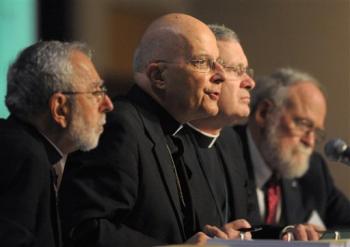Associated Press
June 13, 2008
http://ap.google.com/article/ALeqM5i64rYxpt7S59R2qV9ibf_Qqv-g1AD918Q0KG0
ORLANDO, Fla. — Meeting for the first time since Pope Benedict XVI visited the U.S. and spoke of the deep shame he felt over clergy sex abuse, America's Roman Catholic bishops Thursday began discussing how they can repair relations with priests after six years of scandal.
A small group of bishops and clerics, over a private lunch, started talks about the pain and trauma clergy have suffered since the crisis erupted in 2002. Embarrassment ran so deep that many priests stopped wearing their Roman collars in public at the height of the scandal.
Archbishop Roger Schweitz of the Archdiocese of Anchorage, Alaska, said bishops are trying to learn directly from clergymen what church leaders should do to improve morale.
"I'm hoping with the priests to work out an equitable and just way to preserve the reputation of priests and also take accusations seriously," Schweitz said.
 |
| Cardinal Francis George, Archbishop of Chicago, second from left, leads the general meeting of the U.S. Conference of Catholic Bishops in Orlando, Fla., Thursday, June 12, 2008. Listening to him are Bishop Gerald Kicanas, of Tucson, Ariz., from left, Monsignor David Malloy, of Milwaukee, Wis., and parlimentarian Henry Robert III. Photo by Phelan M. Ebenhack |
Most new claims that flooded dioceses over the last six years involved wrongdoing from decades ago. About 4 percent of priests who served between 1950 and 2002 were credibly accused of abuse, according to research commissioned by the bishops. But those distinctions were often lost in the public outcry over the church's failures to protect children.
Ohio Judge Michael Merz, chairman of the National Review Board, the lay panel the bishops formed to help respond to the scandal, said he learned of one priest who was stretching in a public gym when a passer-by said, "Are you waiting for a boy to lie down next to you?"
Benedict, who took the extraordinary step of meeting privately with victims during his April visit, compared the suffering of innocent clergy to "Christ in his Passion."
"We haven't spent enough time acknowledging the yeoman's' work the priests are doing," said Bishop William Lori of the Diocese of Bridgeport, Conn.
Bishop Gregory Aymond, chairman of the Committee for the Protection of Children & Young People, said bishops began mapping out the healing project more than a year ago. The talks are starting small, with prelates asking priests from different church regions for suggestions and information about the concerns of fellow clergy, said Aymond, of Austin, Tex.
Bishops said the troubles in the priest-bishop relationship vary from diocese to diocese, depending partly on how hard the scandal hit locally.
The discussions are taking place as church leaders prepare to review their national policy on preventing abuse and responding to molestation claims. The plan, called the "Charter for the Protection of Children and Young People," will be re-evaluated in two years.
The National Review Board met earlier this week to start examining how they should conduct the reappraisal, Merz said.
It was clear Thursday that the situation for accused priests would be a key part of the process. Under the bishops' plan, developed in 2002 at the height of the crisis, guilty clergy are either barred from all church work or, if the Vatican permits, ousted from the priesthood.
However, the policy doesn't address how dioceses should monitor and house the accused clerics who are prohibited from working but remain priests. Bishops have struggled with that responsibility, and some victims say children remain vulnerable to the men as a result.
But many priests have complained that the bishops' current plan, adopted under intense public pressure, unfairly requires the same penalties for all clergy, without regard for the individual circumstances.
Merz said the bishops' new attention to priests in no way signals a return to old attitudes, when some church leaders stopped investigating abuse claims if an accused of clergyman denied any wrongdoing.
"It's not a matter of protecting priests," said Merz, who is a victim of sex abuse. "It's a matter of repairing the relationship."
The bishops are scheduled to adopt a statement outlining Catholic opposition to embryonic stem cell research before ending the public part of their meeting Friday morning.
Any original material on these pages is copyright © BishopAccountability.org 2004. Reproduce freely with attribution.